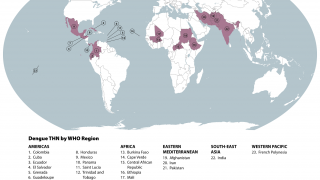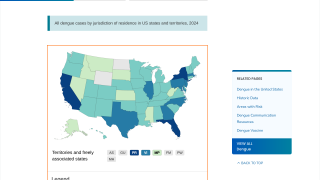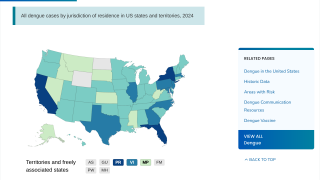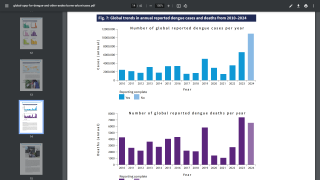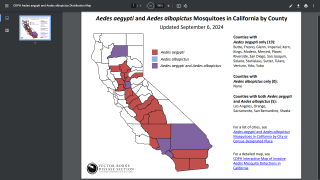Mosquitoes Carrying Bacteria Reduced Dengue Cases

An international alliance of researchers presented new evidence showing diseases spread by mosquitoes fell dramatically in Indonesia, Vietnam, Brazil, and Australia when a certain bacteria was added.
Presented on November 21, 2019, researchers at the World Mosquito Program (WMP) reported a 76 percent reduction in dengue fever transmission in a community in Indonesia and a similar reduction in cases near Rio de Janeiro, Brazil.
The reduction in diseases occurred in communities where they had released lab-grown mosquitoes carrying Wolbachia, a naturally occurring bacteria that prevent mosquitoes from transmitting infections when they bite humans.
But, Wolbachia is not found in the Aedes aegypti mosquitoes, which are the main vectors of dengue.
Wolbachia-infected mosquitoes can be created in the laboratory by injecting it into their eggs.
Professor Cameron Simmons, Director of Impact Assessment and an expert in the epidemiology of dengue at WMP, said in a released press release, "Evidence is rapidly accumulating that areas, where Wolbachia-infected mosquitoes have been deployed, have fewer reports of dengue than untreated areas."
The WMP Wolbachia trials are ongoing and, given the promising results thus far, are being rapidly expanded to Colombia, Sri Lanka, India, and Western Pacific island nations.
These studies are driven by a large body of evidence indicating that establishing Wolbachia in local mosquito populations could offer a safe way to reduce dengue infections, and inhibit chikungunya and Zika virus outbreaks.
Katherine L. Anders, Ph.D., an expert in the epidemiology of dengue at WMP, and her colleagues noted that the work in Indonesia involved an experimental release in 2016 of Wolbachia-infected mosquitoes in an area of about 65,000 people near Yogyakarta City, Indonesia.
The 76 percent reduction represented notifications of dengue among the targeted population recorded by local health authorities, compared with an untreated control area nearby.
Dr. Anders also presented results published earlier this year showing local dengue transmission ceased in Far North Queensland, Australia. Beginning 8 years ago, releases of Wolbachia-infected mosquitoes in local communities in this region led to a 96 percent reduction in cases of dengue-transmission.
The researchers stressed that all of the mosquito releases have been preceded by intensive community outreach and education efforts to inform local communities about the safety of Wolbachia bacteria and the potential impact of the releases on the surrounding ecosystem.
Advocates of this approach to fighting dengue noted that it has several advantages over other methods. Wolbachia has none of the toxicity of conventional insecticides and it does not require genetically modifying the mosquitoes, such as an effort led by the World Health Organization (WHO).
According to the WHO news release, on November 14, 2019, the Sterile Insect Technique (SIT) is a form of 21st-century insect birth control. This technique sterilizes male mosquitoes using radiation to control the spreading of serious diseases.
This process involves rearing large quantities of sterilized male mosquitoes in dedicated facilities and then releasing them to mate with females in the wild. As these male mosquitoes do not produce any offspring, the overall insect population declines over time.
There is also interest in using Wolbachia to help protect people from Zika as well, said these researchers at WMP.
While the intense Zika outbreak of 2016 is over, there are concerns it could return in Brazil and elsewhere.
Meanwhile, Dr. Anders said work is also underway in Yogyakarta City to conduct a gold-standard trial that involves a population of about 350,000.
There have been no safety concerns in any of the communities where Wolbachia has been deployed, said these researchers.
"We are very excited that this self-sustaining and cost-effective method has been embraced by communities and is delivering the public health benefits we expected it would.”
"Our challenge now is to work with partners and governments to bring the method to 100 million people by 2023,” concluded Dr. Anders.
The American Society of Tropical Medicine and Hygiene, founded in 1903, is the largest international scientific organization of experts dedicated to reducing the worldwide burden of tropical infectious diseases and improving global health. For more information, visit astmh.org.
Mosquito-borne disease news published by Precision Vaccinations.
Our Trust Standards: Medical Advisory Committee
- Dengue infections dive where Wolbachia established in mosquitoes in parts of Asia, Australia, and Brazil
- Scaled deployment of Wolbachia to protect the community from dengue and other Aedes transmitted arboviruses
- The AWED trial to assess the efficacy of Wolbachia-infected mosquito deployments to reduce dengue incidence
- Mosquitoes attacked from within



